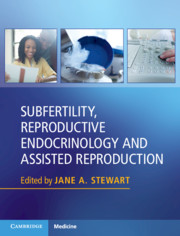Book contents
- Subfertility, Reproductive Endocrinology and Assisted Reproduction
- Subfertility, Reproductive Endocrinology and Assisted Reproduction
- Copyright page
- Contents
- Contributors
- Chapter 1 The Patient’s Perspective
- Chapter 2 Epidemiology of Infertility
- Chapter 3 Investigation of Male Infertility
- Chapter 4 Female Fertility
- Chapter 5 Unexplained Infertility
- Chapter 6 Overview of Management of Male Infertility
- Chapter 7 Semen Analysis and Sperm Function Tests
- Chapter 8 Assessment of Fallopian Tube Patency
- Chapter 9 Endometriosis
- Chapter 10 Congenital Uterine Abnormalities
- Chapter 11 Fibroids and Fertility
- Chapter 12 Tubal Factor Infertility and Tubal Surgery
- Chapter 13 Fertility and the Hypogonadal Male
- Chapter 14 Causes and Investigation of Ovarian Infertility
- Chapter 15 Ovulation Induction for Anovulatory Infertility
- Chapter 16 The Role of Regulation in Reproductive Medicine
- Chapter 17 Common Stimulation Regimens in Assisted Reproductive Technology
- Chapter 18 Oocyte Retrieval and Embryo Transfer
- Chapter 19 Gamete Preparation and Embryo Culture
- Chapter 20 Single Embryo Transfer
- Chapter 21 The Risks of Assisted Reproduction
- Chapter 22 Gamete and Embryo Cryopreservation
- Chapter 23 Quality Management in Reproductive Medicine
- Chapter 24 Early Pregnancy
- Chapter 25 Evaluation and Management of Recurrent Miscarriage
- Chapter 26 Sperm Retrieval
- Chapter 27 Preimplantation Genetic Testing
- Chapter 28 Adjuvant Treatment and Alternative Therapies to Improve Fertility
- Chapter 29 Male Fertility Preservation
- Chapter 30 Female Fertility Preservation
- Chapter 31 Donor Recruitment
- Chapter 32 Gamete Donation
- Chapter 33 Training Opportunities in Reproductive Medicine
- Index
- References
Chapter 7 - Semen Analysis and Sperm Function Tests
Published online by Cambridge University Press: 03 June 2019
- Subfertility, Reproductive Endocrinology and Assisted Reproduction
- Subfertility, Reproductive Endocrinology and Assisted Reproduction
- Copyright page
- Contents
- Contributors
- Chapter 1 The Patient’s Perspective
- Chapter 2 Epidemiology of Infertility
- Chapter 3 Investigation of Male Infertility
- Chapter 4 Female Fertility
- Chapter 5 Unexplained Infertility
- Chapter 6 Overview of Management of Male Infertility
- Chapter 7 Semen Analysis and Sperm Function Tests
- Chapter 8 Assessment of Fallopian Tube Patency
- Chapter 9 Endometriosis
- Chapter 10 Congenital Uterine Abnormalities
- Chapter 11 Fibroids and Fertility
- Chapter 12 Tubal Factor Infertility and Tubal Surgery
- Chapter 13 Fertility and the Hypogonadal Male
- Chapter 14 Causes and Investigation of Ovarian Infertility
- Chapter 15 Ovulation Induction for Anovulatory Infertility
- Chapter 16 The Role of Regulation in Reproductive Medicine
- Chapter 17 Common Stimulation Regimens in Assisted Reproductive Technology
- Chapter 18 Oocyte Retrieval and Embryo Transfer
- Chapter 19 Gamete Preparation and Embryo Culture
- Chapter 20 Single Embryo Transfer
- Chapter 21 The Risks of Assisted Reproduction
- Chapter 22 Gamete and Embryo Cryopreservation
- Chapter 23 Quality Management in Reproductive Medicine
- Chapter 24 Early Pregnancy
- Chapter 25 Evaluation and Management of Recurrent Miscarriage
- Chapter 26 Sperm Retrieval
- Chapter 27 Preimplantation Genetic Testing
- Chapter 28 Adjuvant Treatment and Alternative Therapies to Improve Fertility
- Chapter 29 Male Fertility Preservation
- Chapter 30 Female Fertility Preservation
- Chapter 31 Donor Recruitment
- Chapter 32 Gamete Donation
- Chapter 33 Training Opportunities in Reproductive Medicine
- Index
- References
Summary
Semen analysis is a fundamental part of male fertility investigation. Samples are produced by masturbation, ideally in a private room nearby to the andrology laboratory or submitted within one hour if produced off-site. The ejaculate should be collected in a wide-mouthed, clean, glass or plastic container, from a batch confirmed to be non-toxic to spermatozoa. Patients should be given clear instructions about collection of their sample. To ensure consistency and reliable interpretation of results, there should be a minimum of two days and maximum of seven days abstinence (1), and the complete sample should be collected. Loss of the first portion of the ejaculate, which mainly comprises sperm-rich prostatic fluid, may significantly affect sperm count and concentration.
- Type
- Chapter
- Information
- Publisher: Cambridge University PressPrint publication year: 2019



